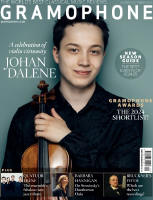Texte paru dans: / Appeared in:
H.Mundi
|
|
 |
|
|
André Campra may be one of the key French opera composers between Lully and Rameau but I suspect at the moment he is best known for his Requiem, a work that already has a fine discography. This new account from Sébastien Daucé and Ensemble Correspondances presents the Messe de Requiem within its church music tradition at Notre-Dame, where Campra held a post in the 1690s.
The Introit unfolds with a similar ‘air of ethereal mystery’ that Nicholas Anderson once admired in John Eliot Gardiner’s account (Erato, 10/80). If I leave this piece long enough I forget how tuneful it is, but fortunately Daucé does not: he opts for a rich, mellifluous quality not unlike Emmanuelle Haïm’s recent live album (Erato, 3/24) but overall lighter in phrasing. Notably, Daucé also maintains a stronger forward thrust across the opening movements. I think here it’s important to name-check at least two of the soloists (they’re all brilliant), but Randol Rodriguez in ‘Te decet hymnus Deus’ and Lucile Richardot in the Kyrie set an extremely high bar. Richardot in particular has an enviable evenness of tone throughout her range that enables her to maintain absolute clarity even in the most gentle of passages. With a noticeable anticipatory sniff from the conductor, the Sanctus is a sprightly triumph – so much so that I fell down a delightful rabbit hole comparing various approaches. I’d loved the perfection of Gardiner’s version and even the more singerly approach of Herreweghe (Harmonia Mundi, 9/87) in their day but this new account holds its own alongside both. Daucé is not one to take tempos too slowly, but neither does he court the impatient snap of Malgoire’s account (Erato, 2/99); in fact there is more of the nimble, dancelike confidence here that I associate with Haïm. It’s a triumph of delicacy and taste. With the renovation of Notre-Dame in progress, Thomas Leconte’s booklet essay explains this programme as one of works by maîtres of the Notre-Dame school in the grand siècle. One particularly good find is the six-voice Mass by François Cosset (c1610-after 1664), which was later partorchestrated by Sébastien de Brossard and recently completed by Daucé himself. Listen out for stylish ornamentation in the ‘Christe’ section, the plainsong incipit to the Gloria accompanied by serpent, and rich instrumental playing in the Agnus Dei. Never one to miss a detail, in the Ave verum corpus by Jean Veillot (c1600-1662) there’s an English cadence on ‘De Maria Virgine’ performed with a raised eyebrow, and heartfelt, lusty cries of ‘placatus’ in Christe redemptor omnium by Pierre Robert (c1618-1699) that will grab your attention. This is a superb recording from one of today’s best ensembles to specialise in French Baroque music.
|
|



